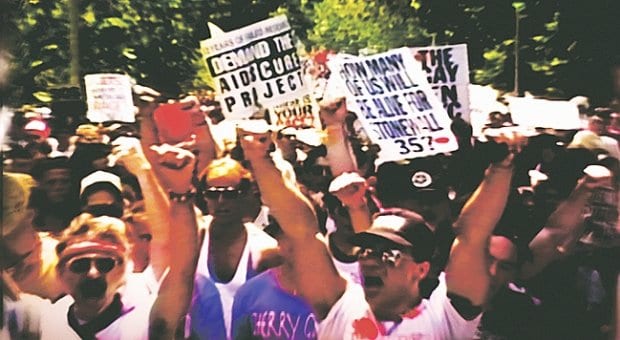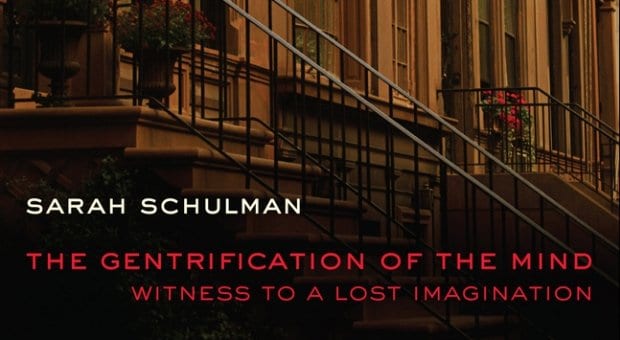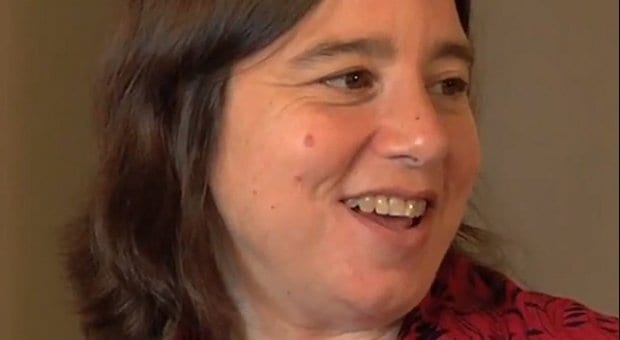
Members of ACT UP (seen here in a new documentary co-produced by Sarah Schulman) eschewed the more palatable tactics of the well-heeled gay crowd.

It’s a typical November Vancouver evening of low-slung clouds and rain-slicked sidewalks as people shuffle into the Western Front for a reading by New York writer and AIDS activist Sarah Schulman.
Stepping into the venue feels a little like stepping back in time. If you were a local queer with an interest in experimental art who came of age in the 1970s, witnessed the rise of the gay liberation movement, and wept and raged through the plague years, the eastside artists’ collective is more than likely a part of your past.
How suitable, then, that Schulman is here to bring that past back to life. The book she’s reading from is her recently published memoir, The Gentrification of the Mind: Witness to a Lost Imagination. She’s also showing a clip from the new documentary she co-produced with filmmaker Jim Hubbard, United in Anger: A History of ACT UP. (The film screens at SFU on Nov 29.)
Tonight, the author of 17 fiction and non-fiction books, and several plays, is preaching to the choir. With a few exceptions, most of the men and women filling up the auditorium’s folding chairs are well over 30; the majority are in their 40s and 50s. They represent the thoughtful, leftist side of Vancouver’s growing class divide, not to mention the widening gap between different generations of queers. We live in a city that’s almost 50 percent non-white, and almost everyone here is white.
Janine Fuller, of Little Sister’s, stands behind a table displaying some of Schulman’s titles, a reminder that back in 1994 Schulman came to Vancouver to testify on the bookstore’s behalf in its court case against Canada Customs, which was stopping shipments of gay books from crossing the border, alleging that they were obscene.
There’s a funny moment in The Gentrification of the Mind as Schulman recounts her realization that the bookstore’s case is doomed when someone has to explain “deconstruction” and “enemas” to the presiding judge. She was right. The win was partial at best.
You won’t see the men and women who’ve come here tonight in most gay magazines or on television. Fashion-forward, they’re not. And no one’s brought kids.
None of the city’s wealthy gay real-estate developers and power elite, who’ve helped transform Vancouver into a city where a crawlspace near the urban core costs more than a million bucks, has shown up, either. Not a Tom Ford suit or Donna Karan office ensemble to be seen.
Maybe they’re at a $200-a-plate AIDS fundraiser. Maybe they’re vacationing in Palm Springs. Maybe they don’t know who Sarah Schulman is, or don’t want to.
Schulman doesn’t fit gay central casting’s version of a well-assimilated queer, either. She’s not a lesbian mom. She’s not Ellen. She’s not on Glee.
She’s uppity and unafraid to point out that the prevailing Out magazine version of gay identity and equality — which is all about pop culture and playing house and where “AIDS is over,” thanks to meds that ostensibly turn people with HIV into supermodels — is missing something: the truth.
Schulman points out that “1.2 million Americans are living with HIV and 70 percent don’t have access to medication.
“Black women are the third highest group [infected with HIV], and half of them are diagnosed in the emergency room,” she continues, by phone from her apartment in New York, a few days after her reading. “The poorer you are, the more likely you are to be undetectable [by the American healthcare system].”
The plight of women, non-whites and the poor, who were ignored during the early years of AIDS (and remain marginalized), and the reluctance of both government and service organizations such as New York’s Gay Men’s Health Crisis to fight on their behalf, were among the reasons ACT UP was founded in 1987.
The grassroots collective of people from all kinds of backgrounds aggressively took on the pharmaceutical companies and relentlessly challenged the US administration’s decision to do nothing to save American lives and avert a global epidemic.
“Not only were there no treatments, gay people had no rights. [AIDS] service organizations were not transforming the crisis, so we had to change tactics,” Schulman says.
It worked.
In The Gentrification of the Mind, Schulman quotes Audre Lorde, an American writer who was her professor at City University of New York’s Hunter College, who said, “The message that you can’t fight City Hall is a rumour being spread by City Hall.”
ACT UP’s members mobilized in-your-face strategies designed to get plenty of media attention — attention that contradicted attempts by a well-heeled, well-connected, old-fashioned community of (mainly) white gay men to perpetuate public images of homosexuality that would be palatable to the dominant straight culture. Men like Andrew Sullivan, the conservative Catholic pundit someone ordained as America’s mainstream media spokesperson for gay issues. Throughout the 1990s, he maintained that marriage was the be-all, end-all of gay rights. (Gay liberationists rejected marriage.) In 1996, in The New York Times, he announced that AIDS was over. (It’s not.)
Schulman transcribes a portion of an interview she conducted with Sullivan several years ago, in which he is often condescending and patronizing, a typical stance of people with status when confronted by someone outside the club who threatens their positions of privilege. Or, in this case, an Anglo-Saxon Catholic man confronted by a Jewish woman smarter than him.
He dismisses her activism as unrepresentative of the majority of the gay population. When Schulman asks him what he contributed to the AIDS movement, he says he’s not a group person. If you’re not a group person, then how can you speak on behalf of a group of people?
The mainstream media rarely call Schulman to comment on the progress of human rights for queers, or AIDS, despite her considerable contribution to literature, film and theatre chronicling both.
Her activism is authentic and organic.
“I grew up on 10th Street and live on 9th Street [in Manhattan’s East Village]. I’m a lifelong New Yorker. I live here and I’ll die here,” she says.
Schulman’s neighbourhood and its environs saw an explosion of culture-changing art and thought in the 1970s and ’80s. The Lower East Side and similar areas in other large, cosmopolitan city centres were affordable and non-judgmental. Queers and other misfits escaping the oppression of Middle America converged, fucked and expressed themselves.
Contrary to urban myth, white gay people and artists did not move into low-rent ’hoods to redecorate poor black people’s homes and flip them so that one day rich white people with stock options could move into exposed-brick lofts with Sub-Zero refrigerators.
In her book, Schulman explains how and why neighbourhoods of a gay culture ravaged by AIDS were usurped by real estate developers, with help from city hall.
She reveals how New York and other big-city politicians looking for bigger tax bases sweetened the pot for developers in order to coerce affluent Americans away from well-off suburbs and gated communities back into city-centre neighbourhoods where gay people had built flourishing, if unconventional, communities. These included offering tax breaks, removing barriers to “market rate” home purchases and rentals, and iffier incentives involving questionable mutual backscratching.
In New York’s case, tens of thousands of men died from AIDS, leaving vacancies right, left and centre. Having no legal protection, their partners were turfed out of the homes they’d shared, property rates skyrocketed, and the neighbourhoods went from homo to homogenized. Manhattan’s three main gay ’hoods in the 1970s and ’80s — the West Village, East Village and Chelsea — which also had the city’s highest AIDS rates, now have the city’s highest residential property rates.
Schulman suggests that the displacement of queers from these neighbourhoods, matched with the huge number of writers, artists and intellectuals felled by the plague, has resulted in a kind of gay cultural genocide. Uncomfortable queer art and ideas have been replaced by, well, the Out magazine version of gay identity. We’ve swept the trauma of mass death under a Pottery Barn throw rug.
Schulman’s uncompromising book pulls the rug out from under us. You’ve got to read it to believe it.
Schulman believes that her family background and upbringing helped shape her sense of being accountable to others and righting wrongs.
“I’m a perfect example of the Jewish-American trajectory. My grandparents emigrated from Russia. My father worked . . . and my mother was a social worker. Now I’m teaching at a public university [her alma mater, the City University of New York].”
Born in 1958, she belonged to the first generation of Jews born after the Holocaust. She calls gay people the new Jews.
“So traumatized by mass death and the indifference of others, we assimilate into the culture that allowed us to be destroyed,” Schulman writes in The Gentrification of the Mind.
More than half a million Americans, and countless millions around the world, have died and continue to die because an American president, Ronald Reagan — who could have stopped AIDS in its tracks when it was first identified in 1981 — didn’t. Three thousand people died on 9/11. Which is the greater act of terrorism?
Back at the Western Front, it’s Q and A time.
A young man nervously raises his hand, and someone passes him a microphone.
“Hi,” he says. “I’m HIV-positive . . . because I was stupid. Isn’t greed the problem? How can we stop greed?”
Schulman smiles thoughtfully. She doesn’t have an answer.
But it’s a good question.
Below is a video interview done earlier this year with Schulman about the documentary United in Anger.

 Why you can trust Xtra
Why you can trust Xtra


